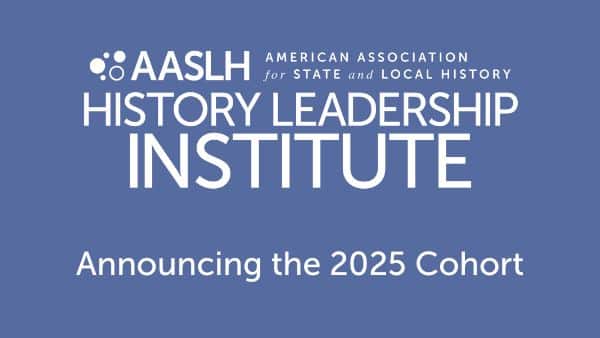
Earlier this week, I participated in the #AASLHchat on “Issues Facing Emerging Professionals”. Contributors shared so many good ideas, and you can see them all in the Storify. But one question in particular really resonated with me:
“How do you identify which skills you need the most?”
I think other participants in the chat hit the nail on the head when they suggested reaching out to experienced history/museum professionals and finding temporary or permanent mentors.
As a formerly shy person, I spent most of my undergraduate and graduate years afraid to ask for help, guidance, or mentoring. I’d devote myself to any homework assignments or readings, trying to learn as much as I could, but limited my own opportunities for growth and career development by avoiding proactive relationships with more experience academics and professionals in my field.

I wish I could say I’ve mastered this skill since then, but I’ve still got a lot ofroom for improvement. Still, I thought I’d share what I’ve been learning about seeking guidance from both a popular young podcaster and a close friend of mine.
It Takes a Village
On the podcast Millennial, Megan Tan explores “what people never teach you—how to maneuver your 20s.” As an ambitious young professional with big goals (and, by the second season, big responsibilities as her podcast becomes a full-time job), she faces challenges that will probably be familiar to emerging professionals in the history and museum fields: How do you enter a competitive field? When should you settle for less? When should you hold out for your dream job? Once you have your dream job, how do you stay creative and avoid burnout? How do you form the right networks?

Pocaster and master advice-asker Megan Tan. Photo by Ben Severance.
What I love about Millennial is the way Megan overcomes these challenges: she finds people in her life or professional networks who know more than she does and asks them “How do you do____.” It seems so simple, but in real life, it takes a lot of courage to call up a former employer, professor, or acquaintance and request their insight into your situation. For Megan, this is always the first step towards learning how to be a twenty-something, and the value of this approach shows in the meaningful answers and practical tips she receives.
How Can I Be You When I Grow Up?
My friend Alex is the most strategic person I know when it comes to career development. He’s always taking advantage of opportunities to network, develop new skills, learn things that will set him apart, and get his name on increasingly important projects and articles in his field.
One thing in particular that he seems to do better than everyone else is to march right up to anyone who is succeeding in a field or career connected to his interests, invite them out to lunch or coffee, and ask them a) what opportunities are there for me in your field and b) how did you get where you are today?
These people, no matter how high up they may be, are nearly always glad to help a motivated young person entering their field. They are typically flattered by the request and often go out of their way to offer unsolicited connections and opportunities.
Recruiting Your Superiors in the Public History Field
I’ve only been in the public history world for about a year,, but I can already come up with dozens of experienced professionals I’ve met who would be delighted to offer guidance to any emerging professional who asks.
Most recently, at the 2016 AASLH/MMA Annual Meeting, a manager at The Henry Ford kept taking time out of his busy schedule to introduce his interns and student volunteers to me so I could help them plug into AASLH networks and services. At that same conference, nine professionals from institutions like President Lincoln’s Cottage and Gunston Hall sat down with emerging professionals at our Mentoring Roundtable to talk about what they’ve found to be most helpful in managing their own careers.

Friendly AASLH’ers at the 2016 Annual Meeting.
Suffice it to say, I’ve found that experienced professionals in this field are more than willing to mentor and encourage newer professionals. Don’t be afraid to find someone whose career you admire and ask “What do I need to know to succeed?” or “How did you get to where you are today?” If you can’t come up with profound or insightful questions to ask them, just invite that person to coffee or lunch and say “What questions should I be asking people like you if I want to advance in my field?”
By writing about this topic, I’m hoping to force myself to start taking my own advice. So, here’s to being brave and recruiting our superiors to help us build our dream careers.
Have any tips for me or other emerging professionals as we learn to navigate the field? Tweet it to me @Hannah_RFH or share it with the AASLH Emerging History Professionals Affinity Community @AASLH_EHP.


